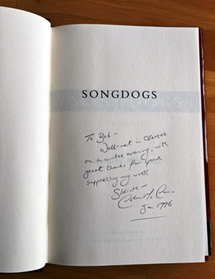
Readers are accustomed to the reality that a book's contents may begin to fade from memory with time. You find yourself recommending a favorite title (if you can remember the title) and then being bamboozled by the logical follow-up question: "What's it about?" Booksellers tend to be better than civilians at countering this tendency, largely through practice and particularly when it comes to their favorite handsells.
But a missing book--the object itself? How does that just fade away? It's a mystery, almost a locked room mystery, though we don't lock the rooms here. So where do they go? The plot is quite subtle and I could cite dozens of examples, but let's start with just one. Not long ago my wife and I were talking about Colum McCann's wonderful 1998 novel, This Side of Brightness. We have all of McCann's books in our collection, most of them signed and personalized because we love his work and, as it happens, Colum and I have been crossing paths occasionally for nearly 30 years.

|
|
| The King's English's Anne Holman with Colum McCann at MPIBA FallCon in 2019. | |
At a first novelists event in Vermont in 1996, he inscribed a copy of Songdogs to me with the words: "Well-met in Chester on a winter evening, with great thanks for your supporting my work. Sláinte." Whenever he read at the Northshire Bookstore, where I worked as a bookseller, we would usually have a pint or two with friends and colleagues afterward. And just before the pandemic rolled in, we chatted when he was on tour promoting Apeirogon at MPIBA's FallCon in Denver, Colo.; and later at the 2020 Winter Institute in Baltimore, Md.
I know. That's a lot of background detail just to make this point: When I finally decided to venture downstairs to our home library and fetch my treasured copy of This Side of Brightness from the shelf, I was confident it would be there. But it wasn't. And if Colum's other titles had a hand in its escape, they weren't snitching.

It's not like we never cull our collection. We're not book hoarders. But every time I decide to part with a signed or, more reluctantly, a personally inscribed book, it's usually for space considerations, a logical decision prompted by the realities of the business I'm in. I've received (acquired is too ambitious a word for the way in which my books accumulate) many signed editions over the years. Some mean a great deal to me; others not so much.
I'm sorry to say there are books I would never miss, though they seem the most reluctant to run away from home. That reminds me of a possibly apocryphal story about George Bernard Shaw finding a copy of one of his works in a used bookshop and noticing it is signed: "To ___, with esteem, G.B. Shaw." Buying the volume, he subsequently returned it to the original owner with an additional inscription: "With renewed esteem, G.B. Shaw."
I do know, however, what's worth keeping for me. There are books on our shelves that I'd never part with for reasons that can be emotional as well as intellectual. You know what makes certain books in your life talismanic, and part of that magic transcends the pages.
In a recent Guardian piece headlined "Reading is precious--which is why I've been giving away my books," Rhiannon Lucy Cosslett wrote: "Some people treat books like totemic, magical objects.... When I moved in with my husband, he had very few books, not because he is not a reader, but because he grew up in a Buddhist household, prefers an uncluttered environment and places little value on physical objects. Once he has read a book, he simply donates it or gives it away, and holds on only to the ones he is sure he will reread. Extreme book-fetishists may argue I should leave him, but why should he be forced to live any longer with my hoarding?
"I was thinking about him the other day when I saw an Internet discussion about a man who told a bookshop employee that he only owns one book at a time, buying a new one when he has read the last one and got rid of it. 'The horror! How could he? I simply couldn't!' people wrote, leading me to reflect yet again on that contemporary tendency to treat having books as a sort of identity."
Ah, but some books are part of my identity. It's complicated. It's personal. And when they go missing, it also feels like loss.

